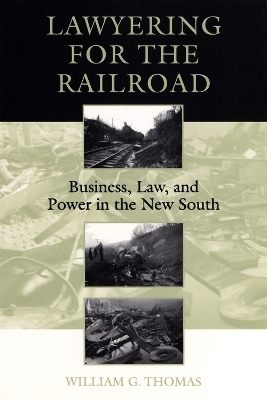
Lawyering for the Railroad
Business, Law, and Power in the New South
Seiten
1999
Louisiana State University Press (Verlag)
978-0-8071-2504-5 (ISBN)
Louisiana State University Press (Verlag)
978-0-8071-2504-5 (ISBN)
- Lieferbar (Termin unbekannt)
- Versandkostenfrei innerhalb Deutschlands
- Auch auf Rechnung
- Verfügbarkeit in der Filiale vor Ort prüfen
- Artikel merken
In this intriguing work, William Thomas introduces the southern attorneys who represented railroads between 1880 and 1916, closely examining their role in the political economy of the South during the Gilded Age and the Progressive Era, a period in which the region experienced sharp change, explosive growth, and heated political contests.
Lawyering for the Railroad provides the first full account of railroad monopoly power, tracing its sources and effects in the southern political economy. Issues touching on railroad development were major components of politics in the days of both Populism and Progressivism, and railroad attorneys -- often in their role as lobbyists -- were always in the middle of the action. They distributed free passes to legislators, retained the best counsel for their clients, laid out the legal agreements to form monopolies, and instituted practices to ensure quick and favorable settlements for the railroads. In this intriguing work, William G. Thomas introduces the southern attorneys who represented railroads between 1880 and 1916, closely examining their role in the political economy of the South during the Gilded Age and the Progressive Era, a period in which the region experienced sharp change, explosive growth, and heated political contests. Thomas tells his fascinating story with legal department records from some of the largest interstate railroad companies in the South. With the help of these records, he demonstrates how the railroads tried to use the law and the legal process to mold the southern political economy to their ends and what kind of opposition they faced. Standing at the crossroads of business, law, and politics, Lawyering for the Railroad gives context, depth, and specificity to what have been cursory glimpses into the shady world of corporate power in the Gilded Age. From small-town lawyers to big-city firms, the story of the railroad attorneys brings into focus the many ways the interstate railroad transformed the South.
Lawyering for the Railroad provides the first full account of railroad monopoly power, tracing its sources and effects in the southern political economy. Issues touching on railroad development were major components of politics in the days of both Populism and Progressivism, and railroad attorneys -- often in their role as lobbyists -- were always in the middle of the action. They distributed free passes to legislators, retained the best counsel for their clients, laid out the legal agreements to form monopolies, and instituted practices to ensure quick and favorable settlements for the railroads. In this intriguing work, William G. Thomas introduces the southern attorneys who represented railroads between 1880 and 1916, closely examining their role in the political economy of the South during the Gilded Age and the Progressive Era, a period in which the region experienced sharp change, explosive growth, and heated political contests. Thomas tells his fascinating story with legal department records from some of the largest interstate railroad companies in the South. With the help of these records, he demonstrates how the railroads tried to use the law and the legal process to mold the southern political economy to their ends and what kind of opposition they faced. Standing at the crossroads of business, law, and politics, Lawyering for the Railroad gives context, depth, and specificity to what have been cursory glimpses into the shady world of corporate power in the Gilded Age. From small-town lawyers to big-city firms, the story of the railroad attorneys brings into focus the many ways the interstate railroad transformed the South.
William G. Thomas teaches history at the University of Virginia, where he is director of the Virginia Center for Digital History.
| Verlagsort | Baton Rouge |
|---|---|
| Sprache | englisch |
| Maße | 151 x 227 mm |
| Gewicht | 531 g |
| Themenwelt | Geschichte ► Teilgebiete der Geschichte ► Wirtschaftsgeschichte |
| Recht / Steuern ► EU / Internationales Recht | |
| Recht / Steuern ► Öffentliches Recht ► Umweltrecht | |
| Technik | |
| ISBN-10 | 0-8071-2504-0 / 0807125040 |
| ISBN-13 | 978-0-8071-2504-5 / 9780807125045 |
| Zustand | Neuware |
| Haben Sie eine Frage zum Produkt? |
Mehr entdecken
aus dem Bereich
aus dem Bereich
die Ukraine, Polen und der Irrweg in der russischen Geschichte
Buch | Hardcover (2023)
C.H.Beck (Verlag)
28,00 €


